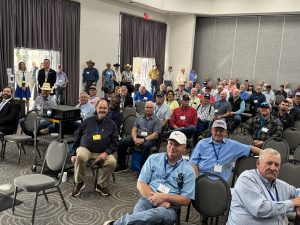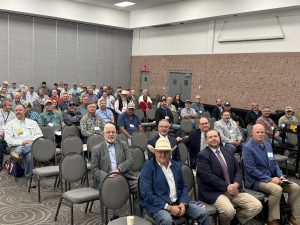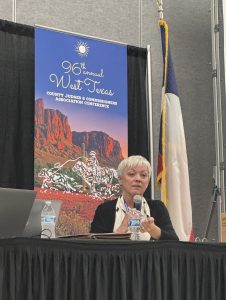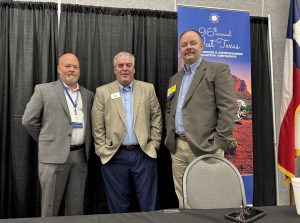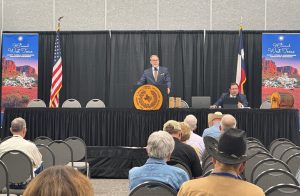Some 250 County Judges and Commissioners convened in Taylor County April 22-25 to study the latest issues affecting grassroots government including emergency management, guardianships, and tax abatements.
The 96th Annual West Texas Conference included an early bird session on Emergency Management.
Hemphill County Judge Lisa Johnson shared lessons learned during the Smokehouse Creek Fire, which ravaged parts of the Texas Panhandle during late February and early March 2024. Fellow presenters praised Johnson for her resolve and leadership as she led her county’s response to the largest wildfire in Texas history.
Oldham County Judge Shawn Ballew (left), former Childress County Judge Jay Mayden (middle), and Armstrong County Judge Adam Ensey said research and negotiation are among the keys to developing a tax abatement agreement that works for your county.
Abatement agreements are available for viewing on the comptroller’s website at https://bit.ly/abatement-agreements.
“Go study those agreements and see what others have done,” Ballew suggested. “Ask yourself, ‘What does my county need?’ ”
During the panel discussion, Ballew highlighted the value of research, saying he subscribed to a newsletter from a company his county was considering for an abatement.
“A week before we finalized our agreement, I was completely familiar with the company,” he continued.
Ensey consults with fellow officials and studies other agreements to help him negotiate the best possible abatements for Armstrong County.
“I look at it as a long-term vision for what we want and need for our county,” Ensey explained. “You can negotiate, and you can be creative as you develop your agreement.”
“Always, always check out the company up front,” cautioned Mayden, now a county relations officer with the Texas Association of Counties. “Go into the process with an open mind and ask for what you need.”
For example, you may include a road use or restoration agreement in your abatement. Oldham County required one company to bring an affected road back to the original standards; the company proposed a different type of road, but Oldham County did not have the equipment or personnel to maintain what the company wanted to build, hence the sticking point in the agreement.
“If you need a brush truck because of the changes that will be made, then ask for it!” Mayden added. “Ask for what you need, and if you are told no, then ask why!”
“A tax abatement agreement needs to be a good fit for your county to be successful,” Ensey summarized. “We negotiate everything. And if you have trouble getting it down on paper, then it is likely not a good fit.”
Ensey negotiates on behalf of Armstrong County and then takes the information back to the full court.
“I tell the representative that I have four County Commissioners, and we may start all over after the Commissioners have given guidance and input,” Ensey said.
In conclusion, the panel encouraged officials to consult with other counties, study other abatements, ask and re-ask questions if needed, and go back to the negotiation table as often as necessary until you have an agreement that works for your county.
State Sen. Kevin Sparks took time out from a busy week at the Texas Capitol to discuss key issues including a shortage of health care workers, water concerns, and the electric grid. He also took questions from the audience on specific bills and expressed appreciation to officials for their important service at the grassroots level.
“Thank you for what you do for your communities,” Sparks said, “because it matters!”




